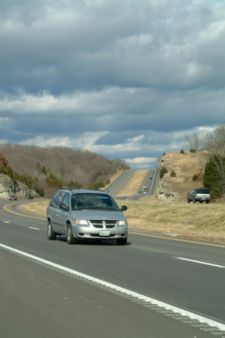Category:231 Typical Section Elements for Roadways

Introduction
The cross section of a roadway is composed of several distinct parts. They are:
- the median (for divided roadways)
- the lane
- the shoulder
- the inslope
- the roadside ditch
- the backslope and
- the clear zone
- the bridge
When the selection of widths, slopes and grades for these elements are combined with the function, service level, traffic and anticipated posted speed of the roadway, the basic configuration of the proposed facility is determined. A well-designed facility combines the preferred values for each of these elements in a safe cost efficient manner within the context of the community.
It is important to define two frequently used terms. They are:
- Roadway: The portion of a highway, including shoulders, for vehicular use. A divided highway has two or more roadways.
- Travelway: The portion of the roadway for the movement of vehicles, exclusive of shoulders.
To see the relationship of these typical section elements click here.
Articles in "231 Typical Section Elements for Roadways"
The following 8 pages are in this category, out of 8 total.